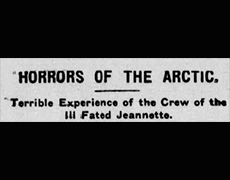
In the early 19th century, Arctic expeditions were fraught with peril, as evidenced by tales like those of the crew of the Jeannette and the Inuit encounter with Ross’s ship in 1818.
When Captain John Ross’s vessel appeared on the horizon near Etah, the Inuit mistook the ship for a ghostly apparition from the moon, captivated by its wooden structure, a rare sight in their wood-deprived environment.
Meanwhile, the crew of the ill-fated Jeannette experienced brutal cold, leading to unimaginable hardship, frostbite, and eventual death. Extreme Arctic cold preserved food and bodies alike, adding a surreal quality to the already unforgiving environment. Desperate survival stories, including cannibalism among native groups, revealed the region’s grim and relentless cruelty.
Horrors of the Arctic

When Ross in 1818 touched at Etah the Esks thought they were being visited by ghosts. With her white sails appearing on the horizon, where the sky melts into an abyss of ocean, what else could the ship be but some great white winged ghost, and what those strange creatures on her decks but lost souls? They thought she, a great bird, had flown from the moon, where wood was abundant, and when they saw her close, her wooden belly and her masts, they whispered, “How much wood there is in the moon — how very much!” Wood is like gold to the Esks.
One of the unhappy crew of the Jeannette writes:
“I put some mercury to freeze and beat it out on the anvil. Our frozen brandy looked like black topaz. We divided meat, oil, and bread with a hatchet. Joshua forgot to put on his right glove; in a moment his hand was frozen. The poor devil wished to thaw his lifeless hand in warm water. It was immediately covered with pieces of ice. The doctor was forced to cut the unlucky mate’s hand off, and he died the next day. Toward the middle of January a caravan of Esks came to ask us for some dried fish and brandy. We added a little tobacco to these presents, which they received with tears of joy. The chief, a feeble old man, told us that the week before he had eaten his wife and two sons.”
Cold more terrible than the white wolf and bear seizes its victims unawares, instantaneously, fatally. The cold purifies the blood, sharpens appetite, favors digestion and stomach. It soothes to sleep by bringing death in the midst of beautiful dreams. This intense cold, so dry, so pure, stops putrefaction, sweetens the air by greatly increasing its density and purifies water. Cold takes the place of cooking, for it makes raw meat, raw fish and tallow eatable.
Source: Idaho County free press. (Grangeville, Idaho Territory), 27 Jan. 1910.

